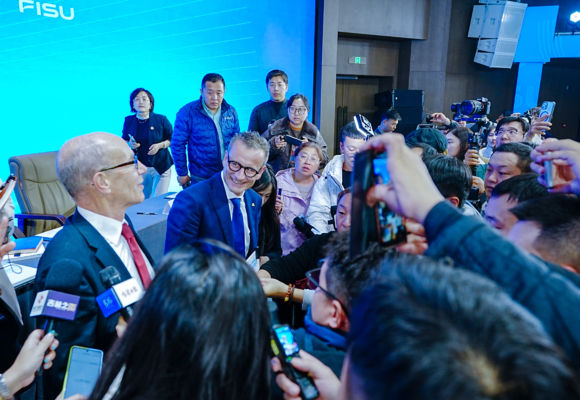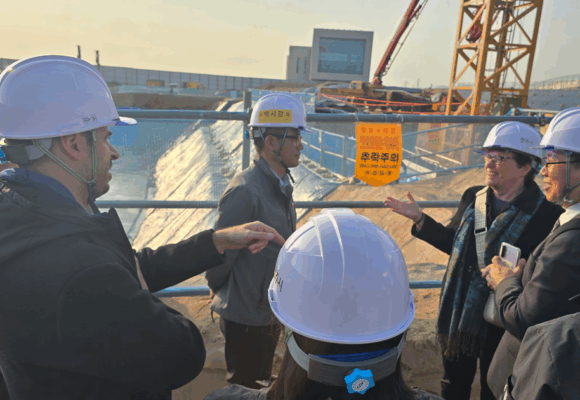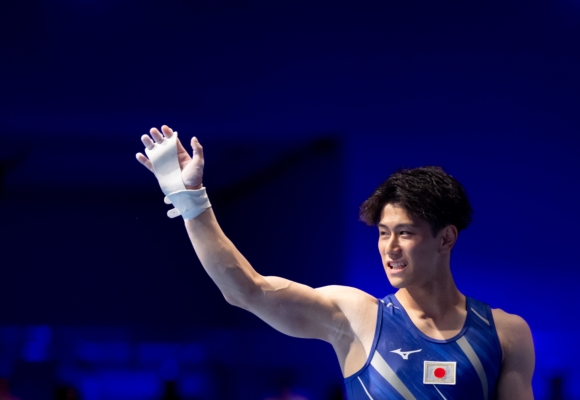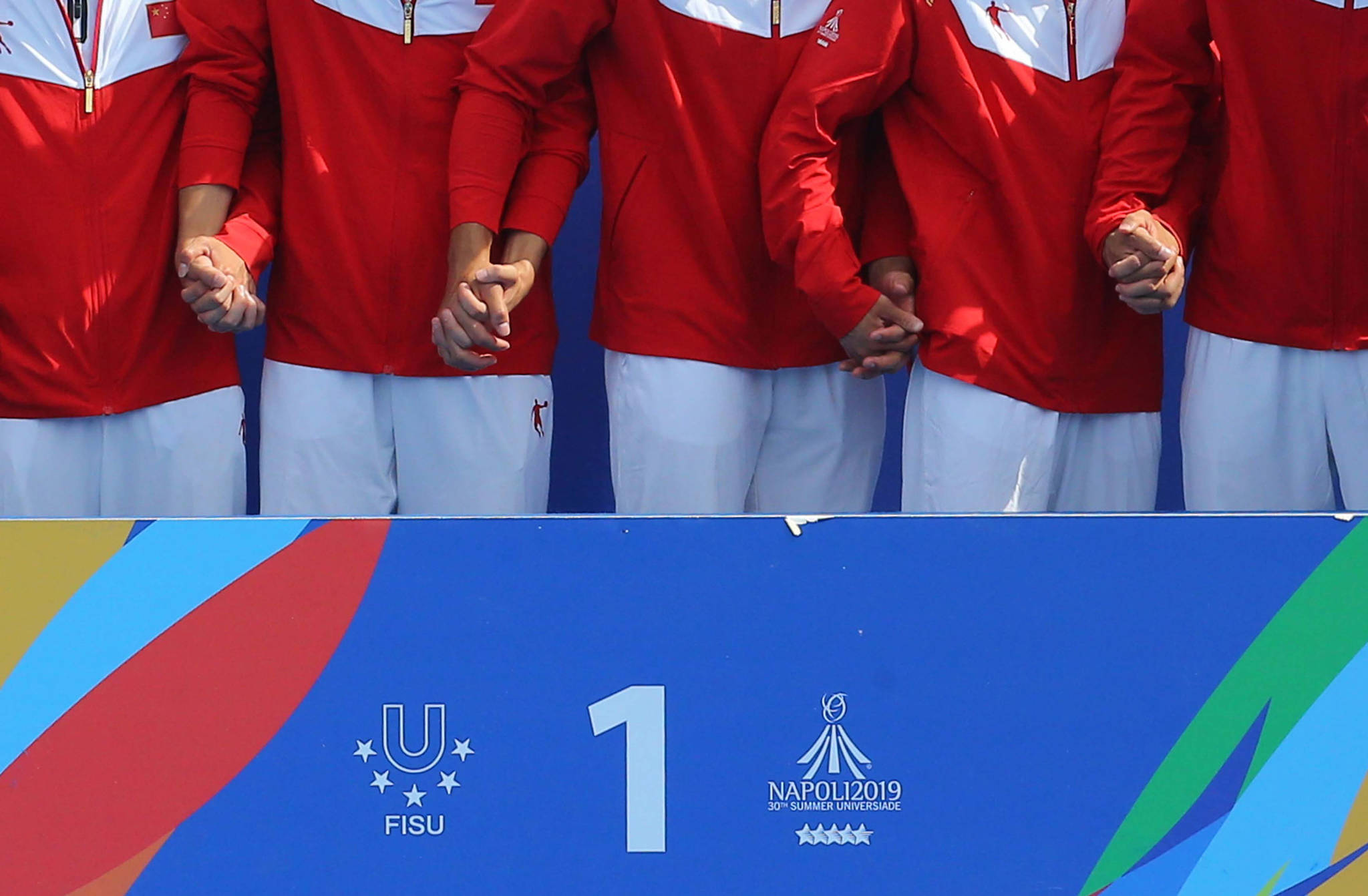
CHENGDU — Few people work by themselves and achieve results on their own— a couple of great artists, a handful of scientists. And when you’re talking about putting on a global multi-sport event like the Summer Universiade with 6,000-plus student-athletes from over 150 countries competing across 18 sporting disciplines, it takes teamwork — plenty of it.
This philosophy was front-and-centre during the Napoli 2019 Debrief session as FISU leaders and critical functional area directors from the Napoli 2019 event delivery team convened in western China with the upcoming Summer Universiade 2021 organising committee.
Eager to leave a lasting legacy with the current Summer Universiade flag bearers, the Neapolitans distilled advice they had gained the toughest, and most impactful, way possible: through experience.
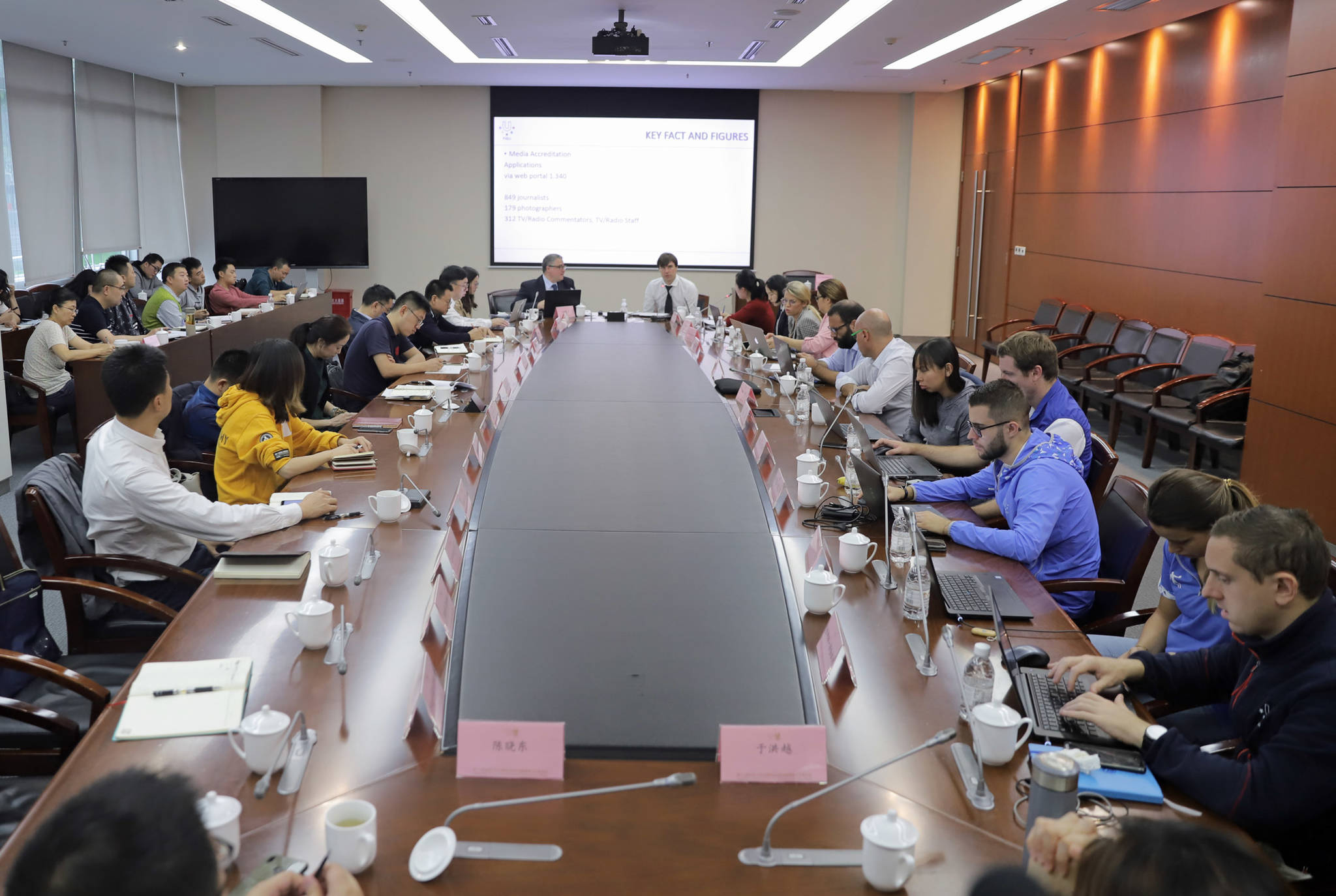 Napoli 2019’s Antonio Gnassi (left) leads a session on the 30th Summer Universiade’s efforts alongside FISU Media’s Torin Koos in the fields of communication, media services, and broadcasting during day three of the debriefLooking to activate a local metropolitan area comprised of 16 million residents and 1.5 million university students, the Chengdu organisers came with inquiring minds. And for good reason: The Summer Universiade 2021 hosts express their desire to put their city on the sports intelligentsia’s map by hosting the region’s first major multi-sports event. Until now, the area’s mega multi-sports competitions have been concentrated in the Beijing, Jakarta, Seoul and Tokyo’s of the world — coastal cities all.
Napoli 2019’s Antonio Gnassi (left) leads a session on the 30th Summer Universiade’s efforts alongside FISU Media’s Torin Koos in the fields of communication, media services, and broadcasting during day three of the debriefLooking to activate a local metropolitan area comprised of 16 million residents and 1.5 million university students, the Chengdu organisers came with inquiring minds. And for good reason: The Summer Universiade 2021 hosts express their desire to put their city on the sports intelligentsia’s map by hosting the region’s first major multi-sports event. Until now, the area’s mega multi-sports competitions have been concentrated in the Beijing, Jakarta, Seoul and Tokyo’s of the world — coastal cities all.
Looking to position the city as an Asian sports hub, inspire their community, and generate economic activity through tourism, Chengdu 2021 organisers began picking up knowledge firsthand with Napoli while attending the FISU Observers Programme at the 30th Summer Universiade.
 During the Napoli 2019 Summer Universiade closing ceremony, the FISU flag was officially passed from the Italian organisers to future event hosts of ChengduThe October debrief and seminar sessions allowed the 2021 host to delve deeper into the strategic plans and operations the Italian organisers followed to successfully deliver 220 medal events over 12 days this past July. The Napoli 2019 sports management professionals were more than happy to oblige, covering the functional areas of sport operations, venue management, transportation, workforce, food and beverage, knowledge management, media services and communication, client experience, planning, and the “4 C’s”—command, control, coordination, and internal communications.
During the Napoli 2019 Summer Universiade closing ceremony, the FISU flag was officially passed from the Italian organisers to future event hosts of ChengduThe October debrief and seminar sessions allowed the 2021 host to delve deeper into the strategic plans and operations the Italian organisers followed to successfully deliver 220 medal events over 12 days this past July. The Napoli 2019 sports management professionals were more than happy to oblige, covering the functional areas of sport operations, venue management, transportation, workforce, food and beverage, knowledge management, media services and communication, client experience, planning, and the “4 C’s”—command, control, coordination, and internal communications.
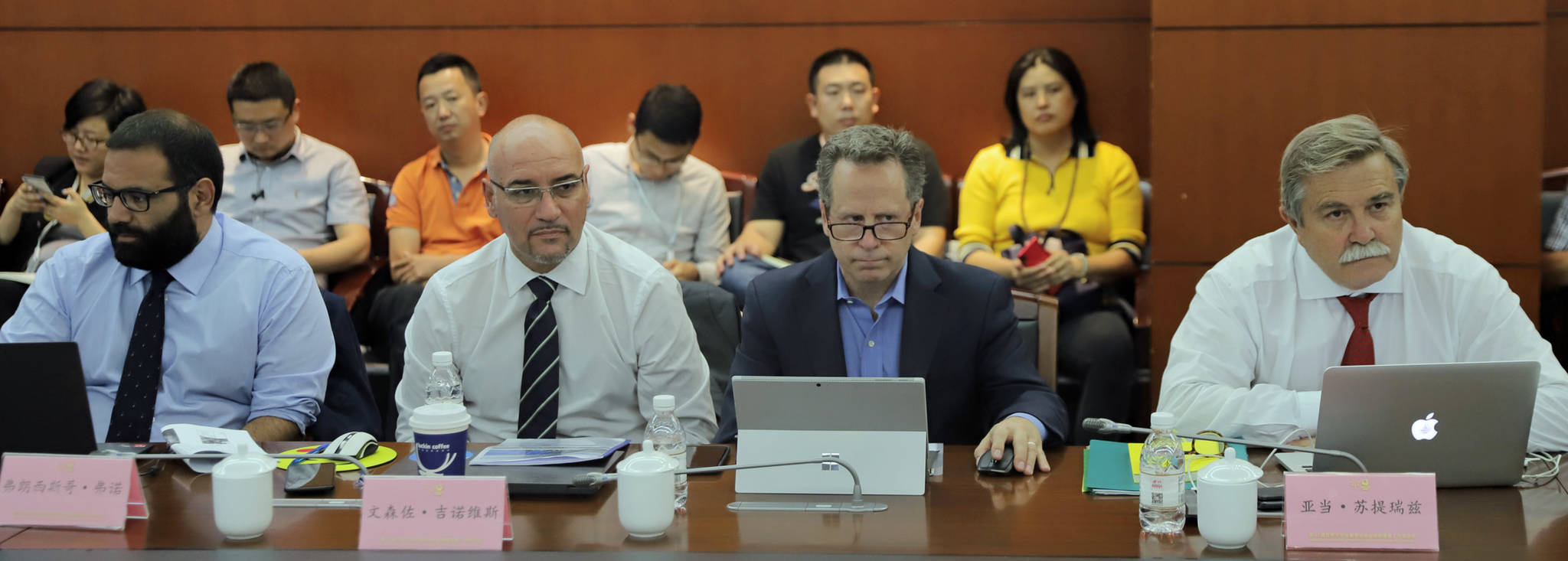 Adam Sotiriadis (right) and seven other members of the Napoli 2019 Summer Universiade organising committee were in Chengdu to pass on their learnings on planning, then executing on those intentions, during Universiade-time
Adam Sotiriadis (right) and seven other members of the Napoli 2019 Summer Universiade organising committee were in Chengdu to pass on their learnings on planning, then executing on those intentions, during Universiade-time
Leading the seven-member Italian contingent during the debrief session was Napoli 2019 general coordinator, Adam Sotiriadis.
The university professor and longtime sports management professional was a steadying presence during the Napoli 2019 preparations and operations. Before, during, and after Summer Universiade 2019, Sotiriadis consistently cited internal communication and collaboration as indispensable ingredients to hosting a successful sports event.
“Now you are wiser after your visit to Napoli and these fruitful days during the debriefing,” Sotiriadis said in his closing address. “You have heard from our distinguished colleagues and beloved — I can say eternal— friends, the wonderful journey has started already. Now you go into deeper waters.”
These deeper waters Sotiriadis mentioned are influenced by the Summer Universiade’s 2021 late attribution. Fortunately, debrief participants noted how the 2021 event organisers have moved ahead at “Chengdu Speed” since the city was granted event hosting rights during the FISU Executive Committee meeting this past March.
“Time is ruthless,” Sotiriadis added. “Time cannot stay at our will. Time runs. And timelines are coming, sooner than you can imagine. You must fight to make the timelines to deliver a timeless event.”
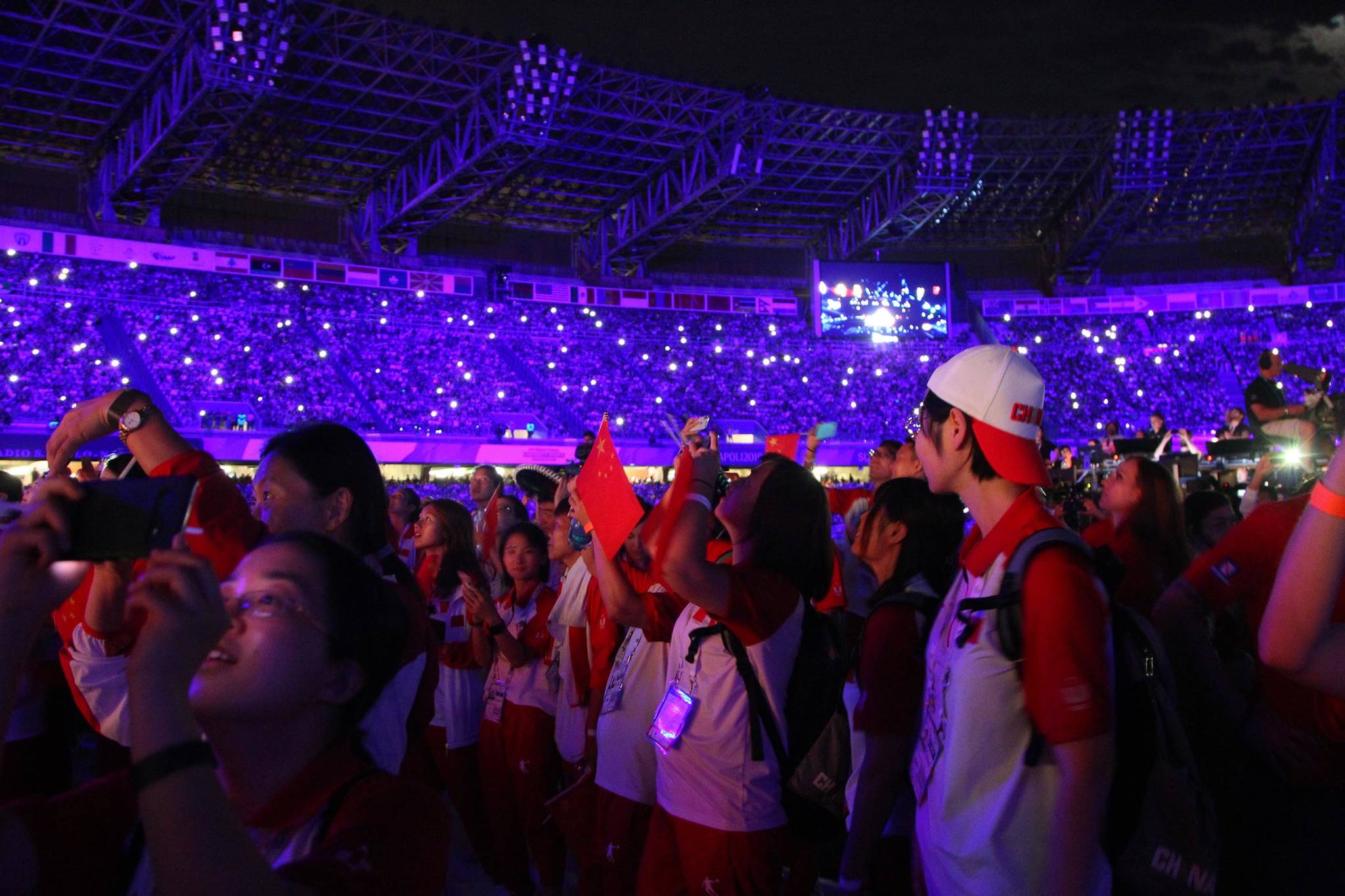 Giving student-athlete a global playing field is central to the university sport mission. Ensuring the athlete experience stays at the heart of a sport event comes down to passion and planning, Napoli 2019 organisers said.Joining Sotiriadis from the Napoli 2019 organising committee in Chengdu were Antonio Gnassi, director of media, digital and broadcast; Valentina De Mari, food and beverage manager; Vincenzo Genovese, director of games services; Roberto Outeirino, director of sport and operations, Francesco Furno, head of venue management; and Matteo Gambuto, head of transport.
Giving student-athlete a global playing field is central to the university sport mission. Ensuring the athlete experience stays at the heart of a sport event comes down to passion and planning, Napoli 2019 organisers said.Joining Sotiriadis from the Napoli 2019 organising committee in Chengdu were Antonio Gnassi, director of media, digital and broadcast; Valentina De Mari, food and beverage manager; Vincenzo Genovese, director of games services; Roberto Outeirino, director of sport and operations, Francesco Furno, head of venue management; and Matteo Gambuto, head of transport.
The FISU team onsite for the debrief was led by Summer Universiade director, Marc Vandenplas.
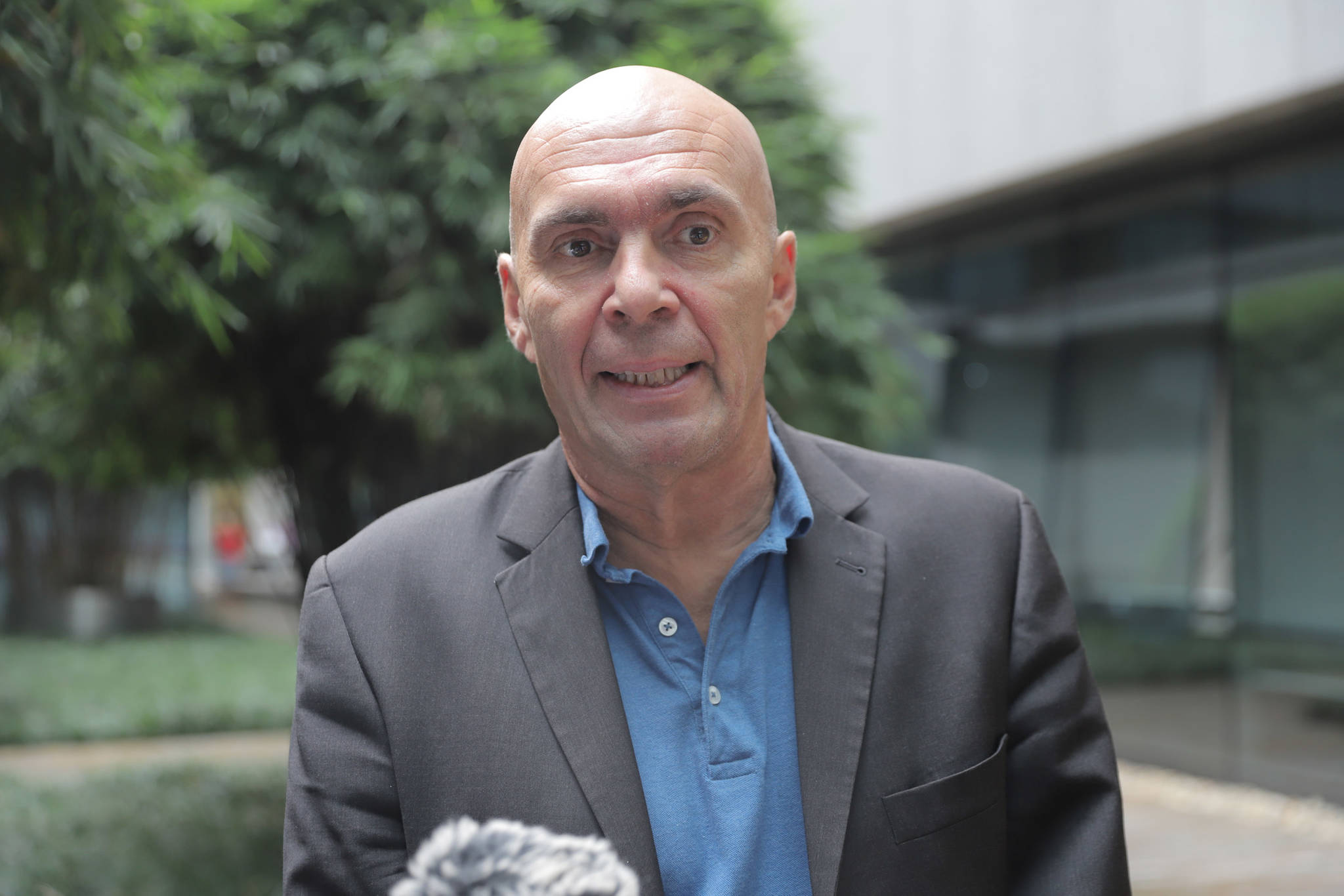 “Chengdu, your organisation of this event was outstanding, just as we have come to expect from you these past months,” Vandenplas said in his closing remarks.
“Chengdu, your organisation of this event was outstanding, just as we have come to expect from you these past months,” Vandenplas said in his closing remarks.
“I would also like to thank FUSC — having China’s National University Sports Federation here brings so much knowledge and valuable information about hosting top-level competitions. FUSC is at every Universiade. They have decades invested in university sport and putting on many first-class university sports events.
“The key to an event’s success is the people, which is an advantage of Chengdu.”
Vandenplas also made special mention of the Ekaterinburg 2023 Summer Universiade’s presence at the debriefing.
Tasked with carrying on the Summer Universiade legacy after Chengdu, Ekaterinburg is already picking up event hosting experiences, both near and far. Russia’s fourth-largest city hosted games of the 2018 FIFA World Cup — and paid a working visit to the Winter Universiade 2019 host city of Krasnoyarsk in early October. In Krasnoyarsk, the Winter Universiade 2019 organising team opened up Krasnoyarsk’s theatre of operations to help further Ekaterinburg 2023’s education into event hosting.
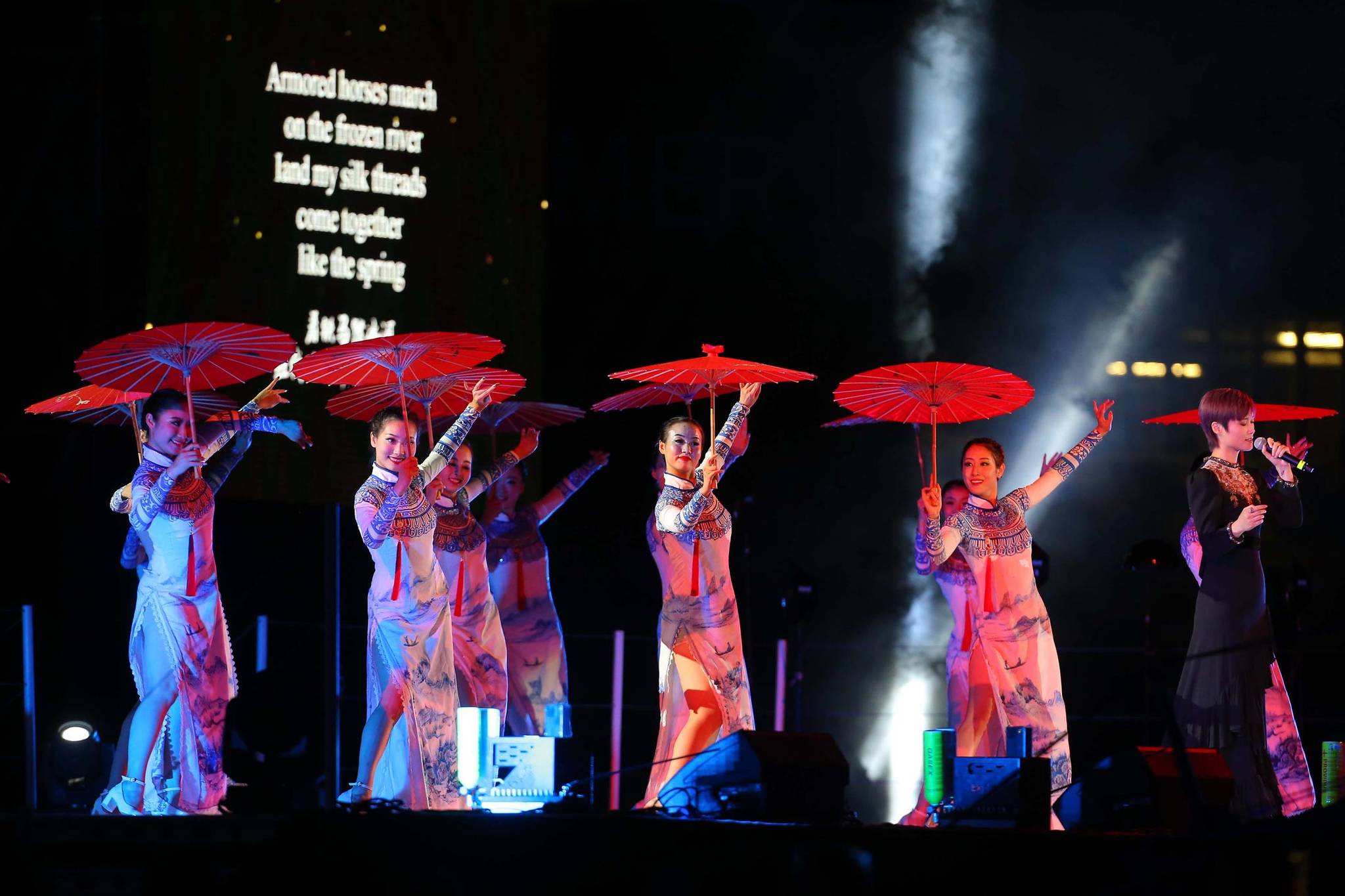 Audiences witnessed some of Chengdu’s renowned cultural performances during the final act of the Napoli 2019 Summer Universiade closing ceremony
Audiences witnessed some of Chengdu’s renowned cultural performances during the final act of the Napoli 2019 Summer Universiade closing ceremony
The debrief’s focused agenda still allowed for participants to take in a bit of the local flavour. This included a nighttime tour through an ancient Hakka town trip that culminated in a hotpot dinner complete with a Sichuan Opera. The Sichuan performance swaps soprano singing for a mélange of folk music, acrobats and dancers, and includes the ‘face-changing’ mask spectacle.
Locals and visitors alike would put down their chopsticks and let the meat and vegetables simmer in spices during the performances. The student-athletes coming to Chengdu will have ample opportunity to return home with cultural experiences beyond the athlete’s village and field of play.
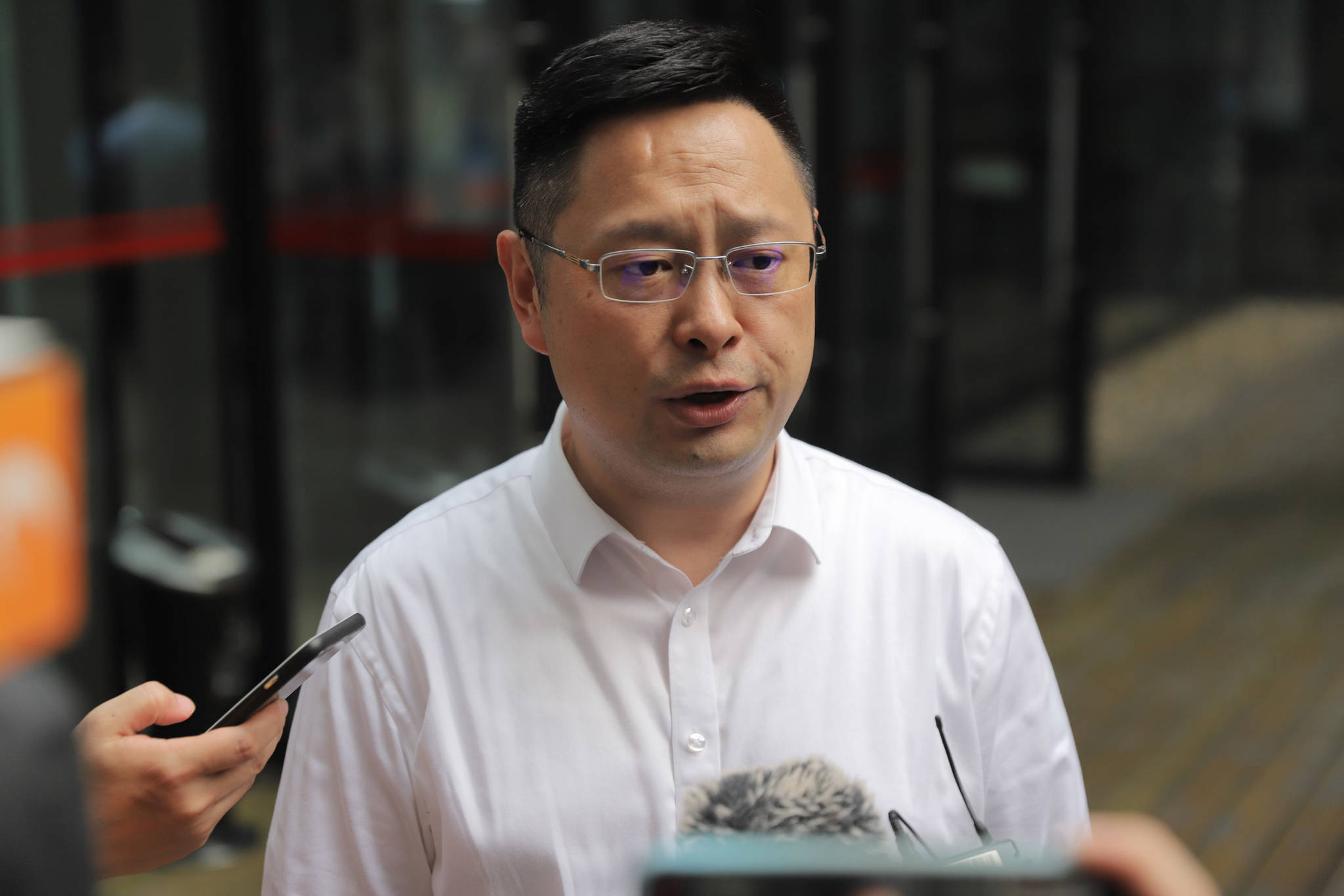 Chengdu 2021’s deputy director, Sheng Gang, officially closed the debriefing with a bilingual address.
Chengdu 2021’s deputy director, Sheng Gang, officially closed the debriefing with a bilingual address.
“The lessons of the hosting a great event like the Summer Universiade have seeped into during the sharing and exchanges we have had with you all these days,” Sheng said.
“Different cultures and distinct stages of our lives, and yet here we all are in Chengdu. We are brought together to practice the philosophy of FISU — today’s stars and tomorrow’s leaders.
“The hope of the Summer Universiade is the hope for Chengdu: a new future for our people. We salute in the work to come; we are invested in making the 31st Summer Universiade as a world-class event that brings in a bit of our distinct Chengdu flavour.
“As the American poet Marianne Moore said, ‘Victory won’t come to me unless I go for it.’”
And Chengdu is going for it.

